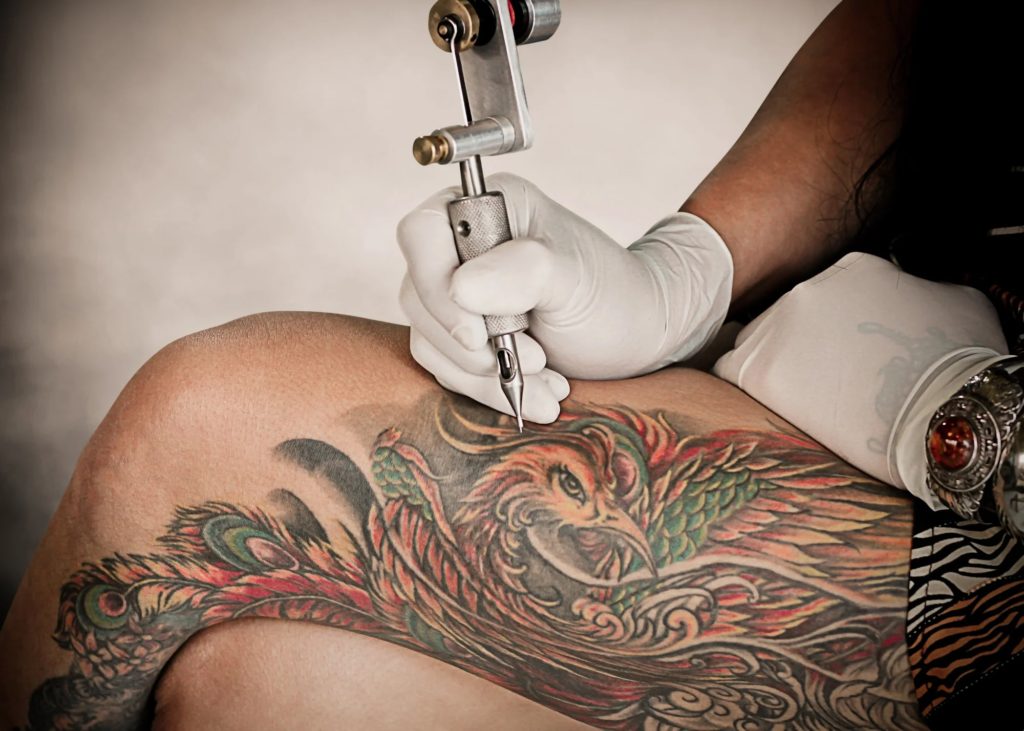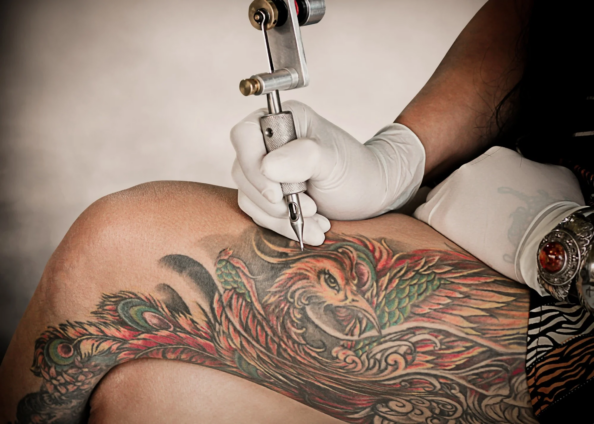Tattoos have been linked to a deadly type of blood cancer for the first time.
Researchers from Lund University in Sweden found that tattooed individuals had a 21 per cent higher risk of lymphoma, compared to people without tattoos.
Lymphoma is a type of cancer that affects the white blood cells, which are crucial for fighting infections.
The link is thought to lie with carcinogenic chemicals in the tattoo ink. When it is injected into the skin, it is interpreted as something foreign and the immune system is activated, causing a low-grade inflammation in the body which can trigger cancer.
Some 46 per cent of 30 to 49-year-old Americans have at least one tattoo, while 22 per cent of all ages, on average, have more than one.
Some 15 per cent of Americans who do not have a tattoo said they are somewhat likely or extremely likely to get one, a poll by the Pew Research Center found.
The researchers identified people with lymphoma aged between 20 and 60 using population registers and then matched them with a control group of the same sex and age but without a diagnosis of lymphoma.
The participants were then given a questionnaire about lifestyle factors to see if they were tattooed or not.
Around 1,400 people with lymphoma answered the questionnaire, as well as 4,193 people in the control group.

In the group with lymphoma, 21 per cent (289 people) were tattooed, while 18 per cent (735 people) were tattooed in the control group.
'After taking into account other relevant factors, such as smoking and age, we found that the risk of developing lymphoma was 21 per cent higher among those who were tattooed,' said Christel Nielsen, the researcher at Lund University who led the study.
The researchers had theorized that the size of the tattoo might impact the risk of lymphoma and thought that a full-body tattoo might be linked to a higher chance of cancer.
However, the results showed that the amount of body surface tattooed did not matter.
The researchers wrote in the journal eClinicalMedicine that they are not sure why this was the case.
'One can only speculate that a tattoo, regardless of size, triggers a low-grade inflammation in the body, which in turn can trigger cancer. The picture is thus more complex than we initially thought,' said Nielsen.
Next, the researchers plan to study whether there is any link between tattoos and other types of cancer.
There are various types of lymphoma, but two main ones: are non-Hodgkin and Hodgkin.
Hodgkin lymphoma is a type of cancer that starts in the white blood cells. It is named after Thomas Hodgkin, an English doctor who first identified the disease in 1832.
It affects around 2,000 people each year in the UK, and 8,500 a year in the US.
The five-year survival rate for the disease is 89 per cent.
Non-Hodgkin lymphoma affects around 8,600 people annually in the US, and 14,000 new people every year in the UK.
With non-Hodgkin lymphoma, cancer has about an 83 per cent survival rate if it is confined to a single region.
Lymphoma occurs when white blood cells in your lymphatic system mutate into fast-growing cancer cells that don't die.
The mutated cells often collect on the lymph nodes — glands that filter out waste products on the neck, groin, abdomen and armpits — forming cancerous masses.
Like most cancers, the majority of the genetic mutations happen on their own, without an identifiable cause.
But research has suggested that having viruses such as HIV, a weak immune system or an autoimmune disease may raise your risk.
Latest Stories
-
Interplast named among Financial Times’ fastest-growing companies in Africa
4 minutes -
GPRTU to reduce transport fares by 15% effective May 25
18 minutes -
Ghana Alphas, Tau Alpha Lambda donate to Abeadze State College
24 minutes -
I’ve closed all ECG’s bank accounts except for one single holding account at GCB Bank – Energy Minister
38 minutes -
Screenwriters Guild of Ghana, Producers Guild, and National Film Authority forge alliance to elevate Ghana’s Film Industry
45 minutes -
Dr. Adu Anane Antwi appointed Chairman of new SEC Board
47 minutes -
Finance Minister charges new NIC board to expand insurance coverage
1 hour -
Patrick Owusu Agyei urges comprehensive port reforms in Ghana
1 hour -
Why Ghana should introduce Municipal Bonds: Unlocking local development through fiscal decentralization
1 hour -
New Insurance Commission board vows bold reforms to expand access and innovation
1 hour -
Ghana’s power paradox: thermal energy surges, but debt to IPPs and fuel suppliers hit $2.5 bn
1 hour -
Encroachment on waterways caused Sunday floods – Hydrological Authority
2 hours -
Expect more heavy rains and flash floods – Meteo agency cautions
2 hours -
Illicit financial outflows a major drain on our revenue potential – Dr Amin Adam
2 hours -
Israel allows five UN aid lorries into Gaza after 11-week blockade
3 hours

